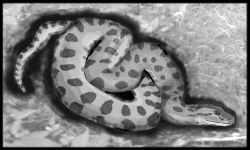|
|
|
|
|
|
|
|
|
|
SPECIES SPOTLIGHT
on

Eunectes murinus
| A.K.A. |
Green Anaconda
|
| DESCRIPTION COLORATION |
Large head; nostrils on top of snout (to aid breathing while in water); short tail; coloration is light greenish-brown with black ovoid spots; small scales.
|
| SIZE |
This animal is the largest snake in the world. The average adult will measure around 16 feet. The largest accepted Anaconda measurement is 33 feet. Adult weight is approximately 550 pounds.
|
| HOME |
The Amazon region as far south as Argentina.
|
| HABITAT |
Tropical rain forest areas in ponds, rivers, streams, and swamps.
|
| LIFESTYLE |
This snake spends most of its time in the water. The Anaconda is somewhat arboreal. It hunts mostly at night and spends the bulk of the day time basking in the sun. It is a solitary animal except when breeding.
|
| PREDATORS |
Humans
|
| FOOD |
Young Anacondas: frogs and fish. Adult Anacondas: pigs, deer, capybara, birds, crocodiles, caiman.
|
|
HUNTING TECHNIQUES
|
The hunting method most often used by the Anaconda is to remain submerged in the water in order to ambush prey animals. It snatches the animal as the prey comes to drink water. The snake then pulls the prey animal into the water. Much of the time, the prey animal will drown; if they do not however, the Anaconda will use its coils in the usual constrictors' method.
|
| BREEDING |
Breeding occurs in the tropical rainy season. During the breeding season, the male is attracted to the female by her pheromones. The female Anaconda gives birth to 10-60 young. An Anaconda hatchling may measure up to 2-3 feet.
|
|
IN CAPTIVITY
|
This snake requires a large amount of room consisting of both a water section and a dry basking area. The environment must be well heated. Feces are usually deposited in water, so frequent water changes are obligatory. Because of their enormous size and tendency toward aggression, this animal is not recommended for captivity outside of zoos and zoo type establishments.
|
| SPECIAL CONCERNS |
The Green Anaconda is threatened by destruction of habitat and predation by humans for its skin. Because of these threats, most of these snakes do not live long enough to reach the outrageous lengths sited in the past.
|
| INTERESTING FACTS |
* Eunectes murinus is an excellent swimmer and can stay completely submerged for over 10 minutes. It is also known to drift in river currents as a way of effortless locomotion. *Because this animal feeds on larger prey items, it often spends days doing nothing but sleeping and digesting. * There is a report of a 130 foot Anaconda. This report, nevertheless, has never been confirmed.
|
|
For more information, visit these other web sites: |
|